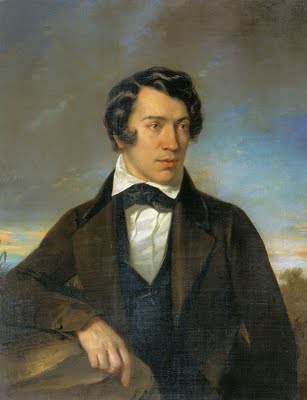
Image credit
Exsurgamus ergo tandem aliquando, excitante nos scriptura ac dicente: Hora est enim de somno surgere, et apertis oculis nostris ad deificum lumen, attonitis auribus audiamus divina cotidie clamans quid admonet vox, dicens: Hodie si vocem eius audieritis, nolite obdurare corda vestra. Et iterum: qui habet aures audiendi audiat quid spiritus dicat ecclesiis.Et quid dicit? Venite, filii, audite me; timorem Domini docebo vos. Currite dum lumen vitae habetis, ne tenebrae mortis vos comprehendant. (Let us therefore arise at last, since the Scripture arouses us, saying "The hour is come for us to arise from sleep." Let us open our eyes to the deifying light, attune that we may hear the divine voice daily crying out "Today if you will hear his voice, harden not your hearts." And again: "He who has ears to hear let him hear what the Spirit says to the churches." And what does he say? "Come, my sons, and listen to me, and I will teach you the fear of the Lord." Run, while you have the light of life, lest the darkness of death overtake you.)
This part of the prologue forms an organic union with the first exhortation to "listen." This is the part of the rule that moves us to action. Listening with the aurem cordis, the ear of our hearts, where we listen to divine realities most directly with fear and love of God, leads us to arise from the sleep of ignorance, from the stupor of forgetfulness, and be attentive to the voice that comes to us in the silence of our hearts and tells us "harden not your heart". It is the call to wake up, to remember that our time on this earth is short, so therefore "run" to the "deifying light" that seeks to exalt us from the darkness of death.

Image credit
The "darkness of death" is the last word in this part of the exhortation, but it is not ultimately the "last word." It is, rather, a memento mortis which St. Benedict adds in order to add force to the command to rise from sleep. Antony van Dyck's painting of a Benedictine monk pointing to a skull communicates our common human destiny. "Dust thou art, and to dust shalt thou return." And yet, it is not really the last word. Echoing Evelyn Waugh in the last scene of Brideshead Revisited, "it is not even an apt word," for the remembrance of death is not an end in itself, but a reminder to look to the "deifying light", that light that descends to us from within the life of Holy Trinity, giving us the promise of lifting us up to the divine life. Our need to listen, then to rise, from sleep is not merely to remember that we must die, but that we must rise from concern for worldly power and from the illusions that beset us, and to wake up to that which is more real, true and alive than we are.
Listening, then, involves action, action that is geared towards making our hearts more open to the life-giving words of Christ. For St. Benedict, the relationship between abbot and monk is one where the one receiving the instruction-the monk-is the one who actively hears the instructions of the master, the abbot, who stands as an image of Christ. Behind the abbot stands Christ, and the charge to every monk is to listen to, and obey, the abbot as one would obey Christ. One is immediately brought to St. Paul's exhortation in Colossians 3:22: "Slaves, obey your masters according to the flesh, not with eye-service, as men pleasers, but in singleness of heart, fearing God..." The abbot-monk relationship is predicated on this principle, and the reason St. Benedict ties the two themes together, i.e. "listen" and "arise," is to impress on his monks the necessary rhythm of listening and obedience. The center of rhythmic relationship is the heart, for it is the "ear of the heart" that receives the instructions of Christ through the abbot, as it is then fired to arise out of its spiritual slumber to "hear the Spirit." Obedience is predicated here on that tension between fear and love that St. Benedict establishes in the beginning of the prologue. We listen not only with our ears, but with our hearts, and obey the commands of "a loving father." The voice of our loving Father bids us, with that mixture of love and authority, to arise from spiritual slumber in order to attune ourselves, our hearts, to his instructions, and it is his Spirit that empowers us in Christ to the task of the opus Dei, the work of God. Knowing that we have such a short time, let us arise!
Exsurgamus!




